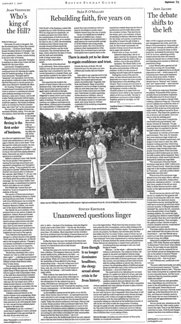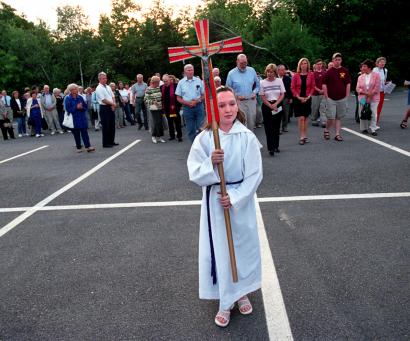 |
By Steven Krueger
Boston Globe
January 7, 2007
http://www.boston.com/news/globe/editorial_opinion/oped/articles/
2007/01/07/unanswered_questions_linger/
[Note from BishopAccountability.org: This commentary was printed on the
Boston Globe's op-ed page with a related opinion piece by Archbishop Seán
P. O'Malley. See our feature
on the op-eds]
Jan. 6, 2002 -- the feast of the Epiphany, when the Magi followed a star
to the Christ Child -- was the day The Boston Globe broke the story about
one priest who had sexually abused more than 130 children. More important
was the revelation that three cardinals knew his history of sexual abuse
and had knowingly transferred him to six different parishes over 34 years.
Unlike the three wise men who broke from Herod after meeting infant Jesus,
the three cardinals followed the toxic secrecy of a hierarchical culture
that became exposed that day.
It's been five years now, but for too many it has been a lifetime. This
happens when your world is turned upside down, particularly your faith
-- or, in the case of the bishops, a threat to their power and privilege.
While we've been told it's "history," the multitudes of those
affected by the clergy sexual abuse crisis -- from the victims and survivors
to lay Catholics and the clergy who serve them, and, yes, even the once-revered
leaders of the church, the bishops -- still wonder when it really will
be.
With a history that dates back to the fourth century, the modern sexual
abuse crisis began to emerge in 1984. However, the Globe article was the
seminal story for the upheaval we are in today, with Boston as "ground
zero." Like the "shot heard 'round the world" it has had
far-reaching, revolutionary consequences -- for the church and society
-- that few could have imagined.
As the headlines spread across the globe, so too did the crisis. More
victims came forward -- as repressed memories were unlocked or new courage
was found. Attorneys general and grand juries became involved. Four dioceses
filed bankruptcy. Today, the church continues to downsize. Bishops seek
to close vibrant parishes while parishioners fight back. Now laity, along
with victims, are seeking justice in courts of civil law. Statute of limitations
reform legislation is sweeping the country. Many Catholics are taking
responsibility while others are leaving for other faiths or forming new
faith communities. Some just feel like they are in limbo -- can it be?
 |
| Altar server Hillary Sussek led a 2002
prayer vigil processional from St. Gerard Majella Church in Canton. Photo by Suzanne Kreiter / Globe Staff-File 2002 |
At the same time, the institutional church has only responded to what has been forced on them by the court of public opinion or the legal system. While there has been progress, it has been painfully slow, inconsistent, and too often lacking in the values of social justice and Christian charity. The expressions of sorrow, the prayers, the Masses, have all been said, but they have fallen short for too many victims, many of whom can not bear to even drive by a church. Policies based on an intention of "zero-tolerance" have been implemented to varying degrees but still only 15 dioceses disclose the names of known perpetrators. Today, bishops are attempting to reassert their authority on everything from gay marriage to who can wash liturgical vessels.
Bishops -- on the whole -- still treat the direct victims as adversaries. The collateral victims, the people in the pews and faithful Catholic clergy, have yet to be meaningfully received at their rightful place at the table of church governance. Across the country, not one bishop has been held accountable for putting children in harm's way. More important, the devastating effects of childhood sexual abuse are still with many of the victims and will be for decades -- if not all of their lives.
Too much truth is too disturbing for too many people. No matter how tired of it we are, and even though it no longer dominates the headlines, the clergy sexual abuse crisis is far from history. A question posed in that now historic story still remains unanswered, "Why did it take a succession of three cardinals and many bishops 34 years to place children out of John Geoghan's reach?"
The history of the crisis is still being written, and it will not be over until we know why it happened. More important, it will not be over until the truth is exposed in every diocese throughout the world; until victims are sought by bishops in the interest of justice; until the responsibilities lay Catholics are necessarily taking are welcomed by the institutional church. It will not be over until we take the long journey of healing, through the gates of truth, acknowledgment,and accountability. The crisis will not be history unless and until our bishops are asking us to do more in the name of justice and the protection of children than we are asking of them.
Steven Krueger, founding executive director of Voice of the Faithful, is a nonprofit consultant.
Any original material on these pages is copyright © BishopAccountability.org 2004. Reproduce freely with attribution.